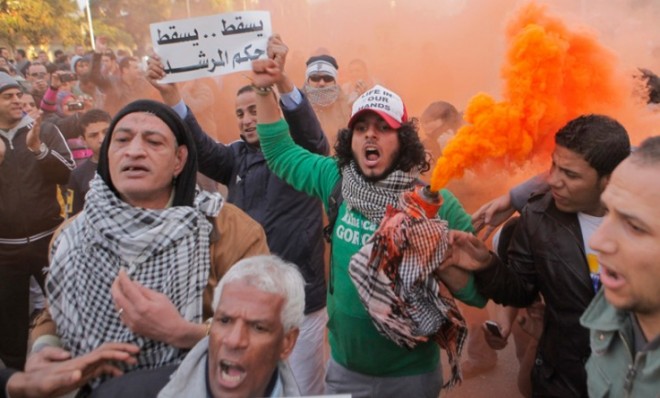Dispatch from Cairo: Egypt's president is under attack from all sides
Goodbye, consensus. Hello, violence

A free daily email with the biggest news stories of the day – and the best features from TheWeek.com
You are now subscribed
Your newsletter sign-up was successful
Seven months after he was elected amidst celebrations and optimistic expectations, President Mohamad Morsi and his Islamist Freedom and Justice party are finding themselves increasingly embattled and isolated.
Morsi's much-lauded panel of advisors, initially made up of 21 luminaries from across the political spectrum, has been hit by a spate of resignations and dismissals, and has lost over half its members. The secularists and Christians began leaving late last year, complaining that Morsi was increasingly partisan and authoritarian. Now over the past week, ultra-conservative Salifi members of the council have been resigning as well, for once agreeing with their liberal rivals.
Though Islamist in ideology, Morsi was able to attract a broad base of support in last year's election by positioning himself as a the face of post-revolution reform, promising to solve a host of social problems in his first 100 days, and most importantly by pledging to run a broad-based, non-ideological administration.
The Week
Escape your echo chamber. Get the facts behind the news, plus analysis from multiple perspectives.

Sign up for The Week's Free Newsletters
From our morning news briefing to a weekly Good News Newsletter, get the best of The Week delivered directly to your inbox.
From our morning news briefing to a weekly Good News Newsletter, get the best of The Week delivered directly to your inbox.
The council of advisors was instrumental in offering credibility on this last point. It was hoped that Morsi could hold together a coalition of Coptic Christians, strict secularists, moderate Islamists, and hardline Salifis. Now, the dissolution of his council is symbolic of the wider trend in Egypt away from consensus, unity, and dialogue and toward partisanship, division, and violence.
Morsihails from the Muslim Brotherhood — a sprawling, immensely influential Islamist group. Besides being the driving force behind the ruling Freedom and Justice party, the Brotherhood has an extensive charitable arm, and interests in successful for-profit businesses. The group is extremely divisive in Egypt and can arouse either suspicion or admiration, depending on who you ask.
These days, Morsi is often accused by both liberals and Salifis of appointing unqualified Brotherhood members to vital posts in government, and of the 10 advisors remaining on the council, five are Brothers.
Initially, the Muslim Brotherhood was seen as the only group capable of holding Egypt together. Given the immense popularity of both radical, Saudi-style Salifi parties and secularists, the Muslim Brothers and their moderate Islamism seemed like the perfect middle ground to ease Egypt into democracy.
A free daily email with the biggest news stories of the day – and the best features from TheWeek.com
However, Morsi's perceived partisanship, combined with genuine ideological differences and continued economic hardship, is robbing the Muslim Brotherhood of its unifying credibility and much of its popular support.
The liberals and Coptic Christian bloc have long since given up trying to deal with Morsi, and their leadership is now gleefully backing anti-government rioters who periodically turn much of downtown Cairo and other cities into veritable war zones. Furthermore, while they are able to present a united front against the Islamists, there is no evidence that this disparate coalition of socialists, businessmen, and former regime figures agree on much else.
The Salifis, for their part, are increasingly split, with one faction cynically making overtures to the liberals (who hold values diametrically opposed to theirs) in order to put pressure on Morsi, and another faction doubling down on their support of Morsi with increasingly incendiary and violent rhetoric.
With new parliamentary elections supposed to happen in the next few months, it is increasingly possible that Morsi and his allies will take a beating from both the left and the right. In any case, Egyptians I know who once risked their lives in the fight for democracy are increasingly disengaging from the political process out of frustration and a perceived lack of good options.
A major pillar of Morsi's presidential campaign was that he would make Egypt's streets safe, improve Egypt's awful public sanitation, and ease its notorious traffic congestion in his first 100 days in office. Now well past his self-imposed deadline, crime and chaos are seemingly getting worse by the day and the streets of Cairo remain clogged with traffic and filth of every kind.
And let's face it: Regardless of which parties win or lose, it is almost certain that the streets will remain dirty, security will remain tenuous, and politics will remain intransigent.
Jake Lippincott earned a degree in Middle Eastern Studies at Hampshire College. He worked in Tunis during the popular uprising there, and is now based in Cairo.
Jake Lippincott earned a degree in Middle Eastern Studies at Hampshire College. He worked in Tunis during the popular uprising there, and is now based in Cairo.
-
 5 cinematic cartoons about Bezos betting big on 'Melania'
5 cinematic cartoons about Bezos betting big on 'Melania'Cartoons Artists take on a girlboss, a fetching newspaper, and more
-
 The fall of the generals: China’s military purge
The fall of the generals: China’s military purgeIn the Spotlight Xi Jinping’s extraordinary removal of senior general proves that no-one is safe from anti-corruption drive that has investigated millions
-
 Why the Gorton and Denton by-election is a ‘Frankenstein’s monster’
Why the Gorton and Denton by-election is a ‘Frankenstein’s monster’Talking Point Reform and the Greens have the Labour seat in their sights, but the constituency’s complex demographics make messaging tricky